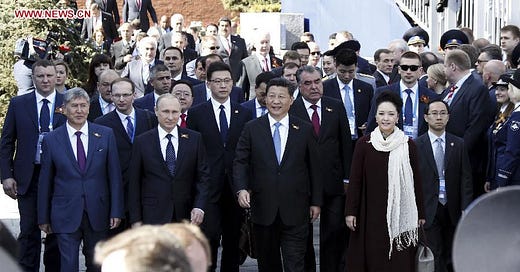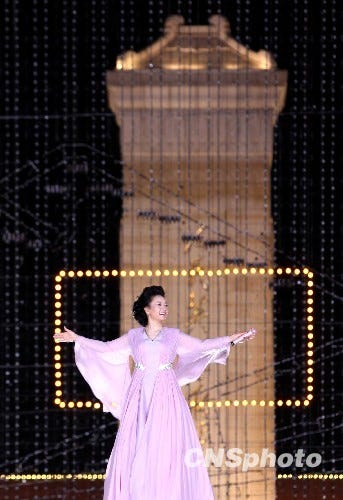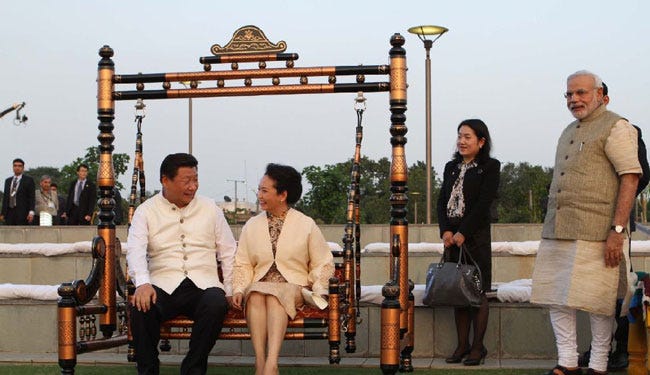Tomorrow is March 8, “International Women’s Day”, a day I detested during all my years in China because of the annual outburst of official condescension towards professional women that it occasioned. This holiday was originally imagined as a sign of empowerment, but in China today, “March 8”, or 三八, is slang for “bitch”.
Nonetheless, in honor of International Woman’s Day, I’d like to write about China’s First Lady. Peng Liyuan had a very successful run as a famous performer but is now promoted by the propaganda machinery as a kind of glamorous trad wife, devotedly subservient to Xi Jinping. He, by the way, makes for an idyllic husband. But I digress.
There are a lot more urgent headlines in the news these days, so why lend any brain cells to the topic of Peng Liyuan? Well, the messaging around her – the role she performs -- is a living example of a society reverting to conservatism in the wake of progressive social gains. That makes her relevant, not just in China. Plus, as I mentioned, International Women’s Day looms. So why not write about a woman?
Peng Liyuan is contemporary China’s first true First Lady. When Xi first took power, she stepped out, à la Jackie Kennedy, Nancy Reagan, Michelle Obama or all the other First Ladies in between. She appears by his side on international trips, smiling and waving, holding his hand and wearing very flattering outfits. She hosts other First Spouses and charms diplomats’ wives. She made quite a splash during Xi’s first official trip abroad as China’s president, when he visited Moscow. In fact, her closest analogue may be Raisa Gorbacheva, another glamorous first lady who broke the silent, frumpy model imposed on the wives of senior Communist apparatchiks.
In Russia for the 70th anniversary V-day parade, 2015
Peng Liyuan is smart about her international role. She deliberately showcases clothes and accessories made by Chinese designers, and she experiments with styles that recall traditional Chinese clothing. A performer all her life, she understands the power of costuming.
Of course, Peng Liyuan is not just a First Lady. Long before most people in China had heard of Xi, they knew about her. In the 1980s and 1990s, she was one of China’s most popular performers. Western writers tend to describe her as a “folk singer” which gives the entirely misleading impression that she was something like a Chinese Joan Baez. In fact, she was a military soprano, belting out nationalistic hymns to concert halls packed with uniformed officers. For years, she reached a national audience during CCTV’s Lunar New Year gala. This is not a style of music that I myself enjoy, but in China, military singers are undeniably popular. Her album sales made her independently wealthy by the 1990s.
One of Peng’s final public performances, on Tiananmen Square for National Day, 2009.
Career gal Peng Liyuan had to dramatically curtail her performances once Xi Jinping was tapped as the next leader of China. She plunged into diplomacy instead. She became the World Health Organization’s Goodwill Ambassador for HIV/AIDS and Tuberculosis, and United Nations officials in Beijing were genuinely thrilled with how enthusiastically she embraced the role. She worked hard to learn English (her struggle – and her progress – is evident in interview clips online). Her competitive nature may have been spurred by the excellent English spoken by the wife of Premier Li Keqiang, Xi Jinping’s one-time rival.
Given all that, and given China’s official commitment to women’s rights (“women hold up half the sky”, Mao once said), you’d think Peng Liyuan would be an inspiring example to career women across China. You would be wrong.
Despite her obvious achievements, Peng Liyuan’s main propaganda role is as a model of wifely subservience. Back in the 1990s, she gave gushy interviews about Xi being the boss in the relationship, throwing in coy details about her own housekeeping. One interviewer (who knew her from showbiz) wasn’t buying it. “Come on, don’t you have a maid?” he retorted.
Back then, it was Xi Jinping who tended to emphasize the importance of her career in his interviews – possibly to explain what was obviously a non-traditional marriage. In fact, the couple lived in two separate cities for the first 20 years of their marriage.
Since the 2010s, the propaganda push has been all about Peng Liyuan as an adoring wife and matronly mother of the nation, much like Evita Perón, the actress who became the saintly icon for Juan Perón’s regime in Argentina.
A poster of these lovebirds — minus Modi — was distributed to households in rural China.
The problem for Peng is that China has a long history of prominent and glamorous women in politics, and an equally long tradition of Confucian male historians who blame them for corruption and regime failure. The ancient Mawangdui tombs preserve the body of a woman who ruled over what’s now Hunan province. Powerful empress Wu Zetian expanded China’s sway in the 7th century; Manchu Empress Cixi presided over the long decline of the Qing Empire, and Soong Mei-ling was the strong-willed conduit of United States support for the Kuomintang during the long Chinese civil war and the KMT’s military dictatorship in Taiwan.
Communist China is allergic to prominent women other than Soong Ching-ling, the childless widow of nationalist independence leader Sun Yat-sen, who is celebrated as a serene and motherly saint. Wang Guangmei, energetic wife of top leader Liu Shaoqi, tried to take on the public role of First Lady in the 1960s, and got punished for it during the Cultural Revolution (it didn’t help that her personal pet project was a vicious and much-resented anti-corruption campaign in the countryside). The best-connected woman of the Revolutionary era, Zhou Enlai’s wife Deng Yingchao, wisely kept herself far from the spotlight despite wielding influence right up until her death in 1992.
Scariest of all was Jiang Qing, wife of Mao Zedong. She was the public face of the Cultural Revolution and, later, the scapegoat for all of its sins. (“I was Chairman Mao’s dog,” she pointed out in her own defense. “Whoever he said to bite, I bit.”) Jiang Qing is often trotted out as the main reason the Communist Party can’t afford to have women in politics today.
All of those women were wives of powerful men. Like Peng Liyuan, they had brains and beauty, but they would never have gotten to a position of wielding that much power if it hadn’t been for their marriages. Peng Liyuan is unusual in that she had her own career first -- as did Jiang Qing, who was one of China’s most famous movie actresses before she married Mao -- but most of the others did not (Deng Yingchao is the other exception, but she probably would have faded into obscurity like most other early female revolutionaries if she hadn’t married Zhou). Conservative Confucian historians who demonize powerful women do have a point – wives generally wield outsized power in an imperial court only when the emperor is weak, and the ‘normal’ political processes of decision-making and succession have fallen apart.
The fallacy of the Chinese distaste for women in politics is that the problem isn’t women in politics, it is wives in politics. During the Mao era, and especially during the Cultural Revolution, wives became a preferred conduit for political attacks, while their husbands pulled the strings. Leaders’ wives became prominent during the Cultural Revolution when all normal methods of political dispute resolution broke down. Overly-prominent political wives are not the problem, they are the symptom of dysfunction in the imperial court.
One antidote for the pathology of overly-influential wives would be to open political channels to women who have succeeded in their own right. Contemporary China is full of women who have achieved thanks to merit, not marriage. Businesswomen, local and provincial government officials, scientists and lawyers and academics and athletes and journalists and doctors have all done well in today’s China, but they are almost entirely absent from the ranks of political power.
Indeed, the number of women promoted to the highest levels of the Communist Party has dropped noticeably during Xi’s dozen years in power. Peng Liyuan’s performance as First Lady corresponds with a general trend, under her husband Xi Jinping, of reactionary politics and social conservativism. As he consolidated power, police cracked down on women’s rights activists protesting groping in the subways (you’d think police would want safe subways, but apparently female activism is the greater threat to law and order). They attacked the gay community, social media pundits, journalists, environmentalists and prominent ethnic minorities (including the shocking mass incarceration unleashed on the Uighur people of Xinjiang). Only after influential independent voices in society were silenced did the security forces move on to wealthy businessmen and Xi’s political rivals.
Peng Liyuan, the most prominent female in China, is smart and talented, successful and gracious. She is very patriotic (or “nationalist”, even), extremely competitive and deploys an intense work ethic. These attributes are all very much admired in Chinese society, and yet, they are not what the Communist Party promotes as important about her. As First Lady, her role is to be a supportive wife, not a successful woman.
This is the true paradox behind Peng Liyuan’s fame. While she builds visibility for the role of First Lady, structural gains for Chinese women have stalled or eroded.
She embodies the paradox of International Women’s Day itself – designating March 8 as “special” allows us to ignore the other 364.25 days of the year.







by design or not, i would say Peng's publicity and elegance contributed significantly to Xi gaining the congenial nick name of "Da Da". no recent senior leader has such a wildly recognized, positive connotated nick name. not to mention Da Da is traditionally only a northern China term, southern China used the term Bo Bo (伯伯)while some others used Da Ye.
during the early days, on Xi's foreign visits, they used to wear matching colors. the color of his tied matched her dress or scarf. no other senior political couples demonstrated such aesthetic and affinity sense. it left a deep impression.
This is a good piece but this quote is nonsense:
"The fallacy of the Chinese distaste for women in politics is that the problem isn’t women in politics, it is wives in politics."
For all of Chinese history until the 1950s there were no women in politics who were not wives.
This is historical misogyny common in virtually all societies to a greater or lesser degree. Let's just call it that and be done with it.
There's no reason to construct this bizarre excuse that the Chinese don't really hate women in power they only hate wives in power. Wives are women and hate is hate. End of story.